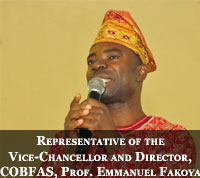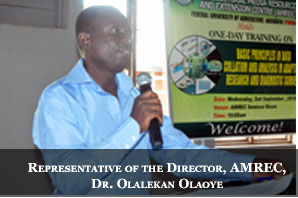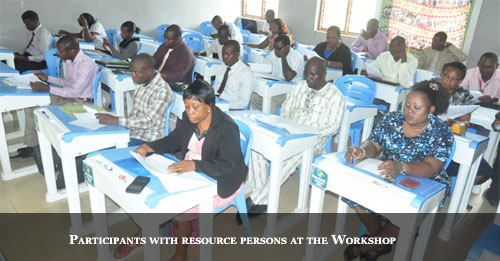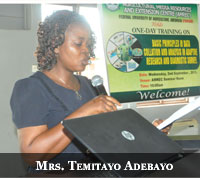
The need to incorporate academic and vocational programmes in institutions of higher learning in the country, to produce sound graduates, have been stressed. This was the piece of advice given by the Vice-Chancellor, Professor Olusola Oyewole, at the 3-Day Workshop on "Enterprise ‘Start Up’ Initiatives for Job and Wealth Creation among FUNAAB Youth Entrepreneurs", organised by the Gender Issues and Youth Development (GIYD) Programme of the Agricultural Media Resources and Extension Centre (AMREC), of the University.

According to the Vice-Chancellor, for the country to overcome the high rate of youth unemployment, increased rate of enterprise failure and abject poverty, especially among Nigerian graduates, academic education must be complemented with skill acquisition, entrepreneurship and vocational education. Professor Oyewole, who is also the President of the Association of African Universities (AAU), lamented the fact that millions of Nigerian youths acquire education without knowing what the future holds for them, due to high unemployment in the country, which according to the Minister of Youth Development, means that about 67 million youths in Nigeria are unemployed, representing 42 per cent of the population.
The Vice-Chancellor, who was represented by Professor Emmanuel Fakoya, the Director, Community-based Farming Scheme (COBFAS), called for the institution of vocational training and skills acquisition in Agribusiness for youths in tertiary institutions as a panacea to unemployment and job creation, stating that, "It should be noted that the technical, vocational and entrepreneurship education has been an integral part of national development strategies in many societies because of its impact on productivity and economic development. Vocational education is another means of empowering people in order to better their lives, and holds the key to national development and also makes for youth self-reliance". He charged the participants, who were mainly Nigerian students to make use of the opportunity to acquaint themselves with skills that could become their source of livelihood and repositioning them to become job-creators rather than job-seekers.
Delivering a paper titled, "Developing a Business Plan for a Successful Entrepreneurial Development", the Director of CENTS, Professor Adewale Dipeolu, identified a good entrepreneur as someone who has ideas, see opportunities where people see problems and identify the opportunities.

He added that having a business plan is essential because it serves as a source of reference, a guide and a bargaining tool which helps to pin-point areas of the business that had been neglected, and to access strengths and weaknesses in an objective way, while giving a framework for explaining the future direction of business to others. On the component of a good business plan, the University don said it must have an attractive front and content page, which should provide detailed information such as an introduction; comprehensive description of the proposed business venture; location analysis; industry analysis; main competitors; strategies and profitability; suppliers; buyers; substitutes; entry conditions; production plan; management; marketing plan; product; price; promotion and place.
In a similar presentation on "Soft Skills and Enterprise Development Strategies", Pastor Adebowale Onafowora, highlighted several enterprise ideas in agribusiness such as livestock production; hydroponics Technology for livestock fodders and vegetables production; black soldier fly worms culture; crops; vegetables and fruits; rice and cassava farming; food processing and value addition as well as energy generation through biogas, biomass and briquettes, among others. He noted that for Nigerian industries to grow, Agribusiness, which is the next green gold must not be stagnant, as he charged Nigerian youths to be ready to pick up skills in these areas, and to start to employ themselves in entrepreneurship ventures so as to bridge the gap in the market. Pastor Onafowora also recommended that the government and institutions should support youths to go into business with incentives especially in the area of Agribusiness.
In a presentation on Bio-gas, the Zoological Park Director, Dr. Moses Oyatogun explained the nitty-gritty of developing a bio-gas digester to the participants, which he said could be used to power a generator set, gas lamp, gas cooker and for electrification.
The Director of AMREC, who was represented by Dr. Olalekan Olaoye, described the workshop as timely and apt in addressing a major challenge facing the nation, while adding that some of the benefits of the workshop would include alleviating the standard of living for the citizenry and minimising the high level of national unemployment which has resulted in many youths constituting themselves into social menace and which can also be associated with the security challenge in the country.
The Co-ordinator of GIYD, Dr. Elizabeth Oluwalana, assured participants that at the end of the workshop, they would be better equipped and empowered with vocational and agribusiness skills in areas such as tufting, value-added herbal production, Benin ceremonial beads, flower vases, patterns made with zou machine, among others, while certificates would be presented to participants.
Meanwhile, academics, extension workers, farmers, financial institutions and non-governmental organisations have been charged to equip themselves with the appropriate principles of data collation and analysis, to assist them in obtaining useful research information from unprocessed and raw data.

This call was made by the Director of AMREC, Professor Victor Olowe, during a one-day training workshop on “Basic Principles in Data Collation and Analysis in Adaptive Research and Diagnostic Survey”, hosted by the Planning, Monitoring and Evaluation arm of the Centre. Professor Olowe, who was represented by Dr. Jacob Olaoye of the Centre, said data was indispensable because of its usefulness to policy-making and management, saying that this call was vital to government, policy makers, farmers, research institutes, non-governmental organisations and other stakeholders. He added that the workshop was organised to address the problems of transforming data into meaningful information that could be used for research.
Welcoming participants to the occasion, the Acting Programme Leader, Planning, Monitoring and Evaluation, Mrs. Temitayo Adebayo, said that the workshop was aimed at correcting any misconceptions among researchers in adaptive research and to discuss extensively on data collation, analysis and interpretation processes for effective and quantitative reports that are vital to policy formulation in the agricultural sector. She, however, charged participants to tap from the fountain of knowledge of the resource persons present at the workshop.
Last Updated on October 2, 2015 by admin
